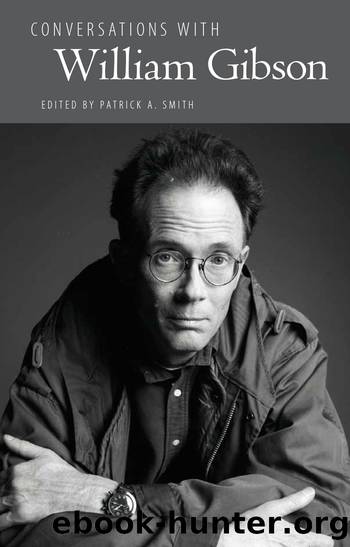Conversations with William Gibson by Patrick A. Smith

Author:Patrick A. Smith
Language: eng
Format: epub
ISBN: 9781626740938
Publisher: University Press of Mississippi
Published: 2014-01-15T00:00:00+00:00
William Gibson Interview
Andy Diggle / 1997
A version of this interview first appeared in Fusion webzine in 1997. Reprinted with permission of and interview text provided by Andy Diggle.
William Gibsonâs first novel Neuromancer, a dense fusion of hard-boiled thriller and data-overload prose, hit the science-fiction scene in 1984 about as unobtrusively as a major star system going supernova. With the exponential growth of the Internet in the decade since Gibsonâs coinage of the term cyberspace, his skewed premonitions have never seemed more relevant. After all, cyberspace is where you are reading this interview, right now.
Andy Diggle: Every month seems to see some weird riff from a Gibson novel make the transition from science fiction into reality. Whilst hailed as a visionary both by techno-nerds and sci-fi geeks alike, Gibson has regarded the hype with a healthy combination of detached interest and dry irony, and remains modest about his own early writingâconfessing that when he began Neuromancer, he didnât really know what he was doing â¦
William Gibson: Absolutely, yeah, absolutely. I tried to weasel out of it, because it was sort of a commission thing. This editor had come in and said, âYeah, I want you to do this,â and I said, âNo way, Iâm not ready. Come back in four years.â And he said, âNo, take this check.â He sort of wrote me a check and gave it to me and he said, âWrite it. The bookâll be about this thick [holding his fingers about four inches apart]. Give it to me and if I like it, Iâll give you another check just like this one.â But I felt very uneasy doing it, and when I look at Neuromancer today, a lot of things people take for literary and science-fictional innovation are in fact the desperate moves of an under-skilled practitioner.
When I started with the short fiction that led up to Neuromancer, I couldnât do the transitions. I could describe a character in a room, but I couldnât get him to the street. Itâs one of the first things that you learn as a writer, and I didnât really know how to do it. And thatâs why, like, at the very beginning of my career I was playing around with this kind of jump-cut technology.
Film and television had a big influence on me. Iâve certainly noticed the real pain in the butt with translating my fiction to the screen is that some of the really cool moves are essentially cinematic, and if you do a literal translation, itâs just cinema. If you think about how youâre going to represent those first-person POV shifting moves in Neuromancer, itâs a nightmare.
Itâs interesting to see, when I wrote Neuromancer, I was so frightened of letting go of the narrative coat hanger that runs through itâitâs very driving stuff, almost like itâs got a backbeatâand I was terrified that I would bore anyone for even a paragraph. But because of that there are other things you canât do in the narrative. Actually, I think the
Download
This site does not store any files on its server. We only index and link to content provided by other sites. Please contact the content providers to delete copyright contents if any and email us, we'll remove relevant links or contents immediately.
4 3 2 1: A Novel by Paul Auster(12354)
The handmaid's tale by Margaret Atwood(7729)
Giovanni's Room by James Baldwin(7301)
Asking the Right Questions: A Guide to Critical Thinking by M. Neil Browne & Stuart M. Keeley(5741)
Big Magic: Creative Living Beyond Fear by Elizabeth Gilbert(5726)
Ego Is the Enemy by Ryan Holiday(5392)
The Body: A Guide for Occupants by Bill Bryson(5065)
On Writing A Memoir of the Craft by Stephen King(4920)
Ken Follett - World without end by Ken Follett(4705)
Adulting by Kelly Williams Brown(4552)
Bluets by Maggie Nelson(4534)
Eat That Frog! by Brian Tracy(4499)
Guilty Pleasures by Laurell K Hamilton(4422)
The Poetry of Pablo Neruda by Pablo Neruda(4079)
Alive: The Story of the Andes Survivors by Piers Paul Read(4009)
White Noise - A Novel by Don DeLillo(3990)
Fingerprints of the Gods by Graham Hancock(3979)
The Book of Joy by Dalai Lama(3960)
The Bookshop by Penelope Fitzgerald(3827)
